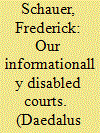| Srl | Item |
| 1 |
ID:
130365


|
|
|
| 2 |
ID:
132760


|
|
|
|
|
| Publication |
2014.
|
| Summary/Abstract |
In order to carry out their functions of deciding particular cases and developing legal rules and principles, courts need information: not just information about the law, but also factual information about the particular matter in controversy and about the world in general. The way in which courts are structured, however, makes it more difficult for them to obtain the information they need than it is for most other public decision-making institutions. As the world becomes more complex, and as sophisticated scientific, technical, and financial information becomes more central to litigation and to the judicial function, the systemic disabilities of the courts in obtaining the information they need become more apparent and increasingly more problematic.
|
|
|
|
|
|
|
|
|
|
|
|
|
|
|
|
| 3 |
ID:
125020


|
|
|
|
|
| Publication |
2013.
|
| Summary/Abstract |
Various explanations have been advanced for the January effect in the existing literature, but no consensus has been arrived at to distinguish one particular explanation from any others. In this paper, a time-series GARCH-M model with conditional variance as a proxy for market systematic risk is applied to investigate the seasonal effects in four countries with different tax system and tax year end: the USA, the UK, China and Australia. Empirical evidence showed a January effect in the USA, a January and an April effect in the UK, a July effect in Australia and no significant seasonal effect in China. This pattern consistently links to tax year end and the tax system in the sample countries; however, no clear evidence has been found to support the proposition that market risk is higher or priced highly only in calendar months with a seasonal effect. However, to reflect the seasonal effect, an interactive dummy variable is added into the time-series GARCH-M model, and the seasonal effects are explained away. The results of the sampled countries support the proposition that market volatility increases when it is close to the date of financial statement performance due to the uncertainty of the financial information.
|
|
|
|
|
|
|
|
|
|
|
|
|
|
|
|